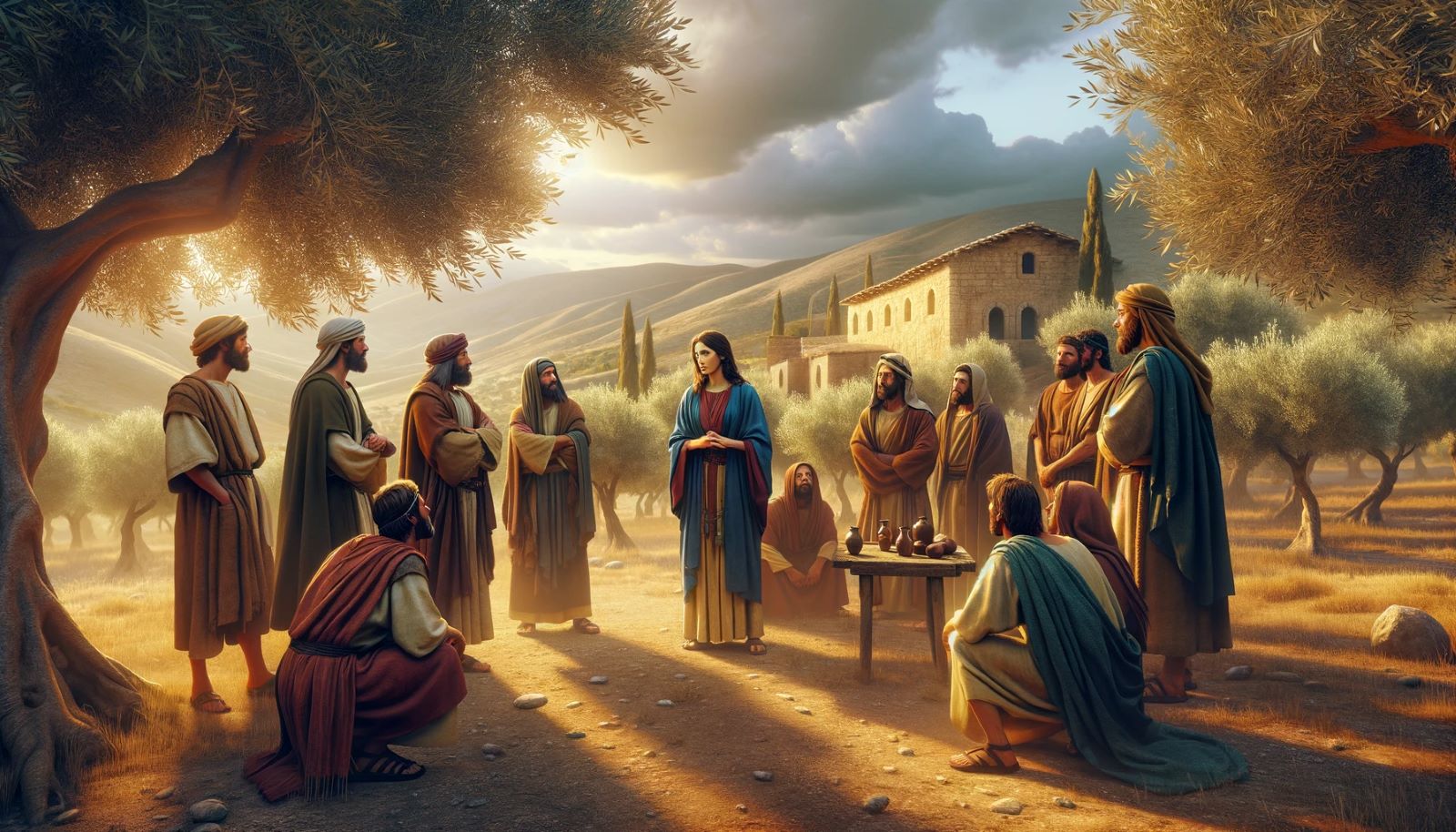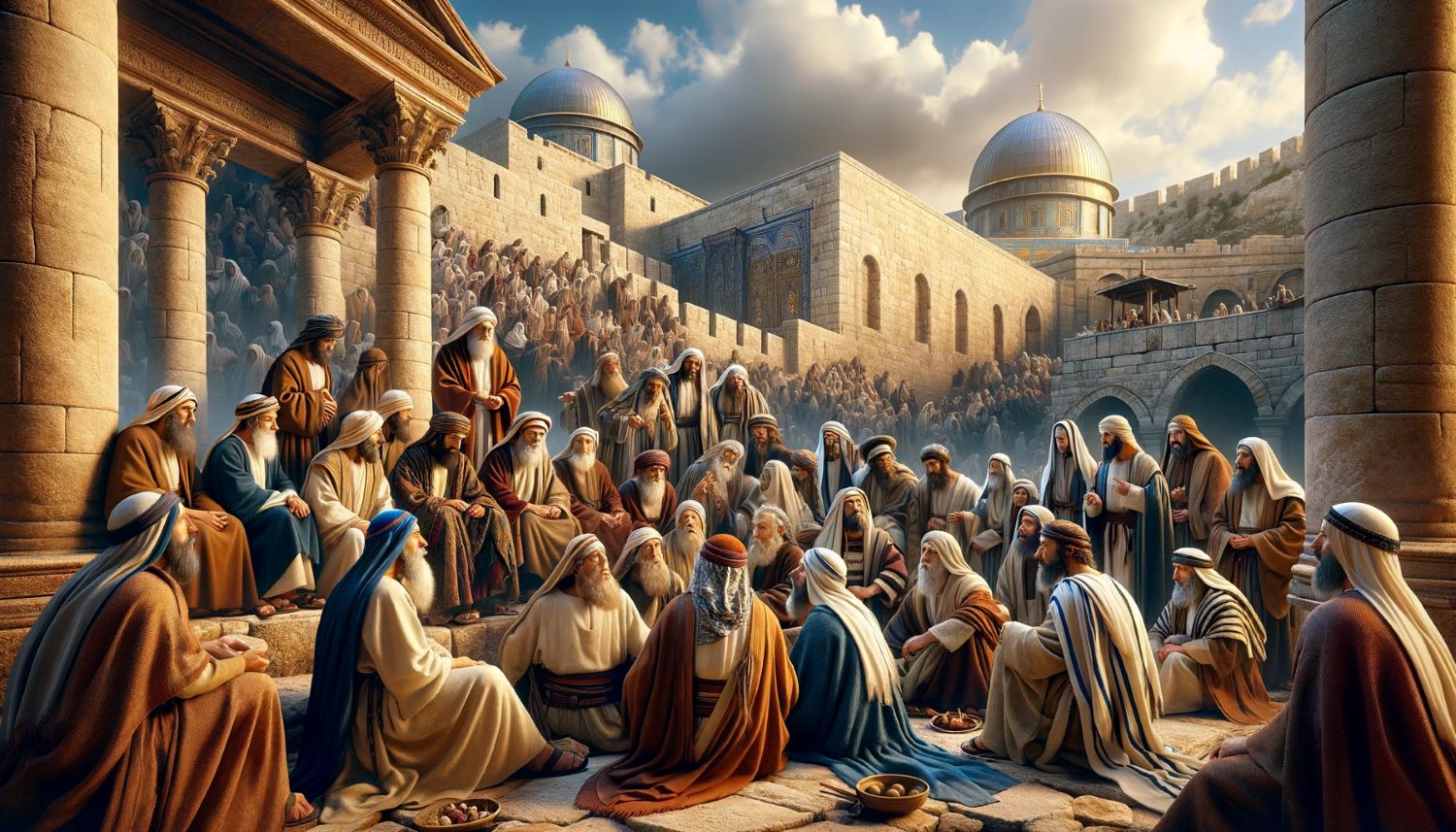Home>Bible Facts>How Many Female Apostles Are In The Bible


Bible Facts
How Many Female Apostles Are In The Bible
Published: February 23, 2024
Ericka Andersen, an editor at Christian.net, expertly merges digital strategy with content creation, focusing on faith and societal issues. Her communication skills enhance the platform's engaging narratives, fostering meaningful dialogue on belief's impact on society.
Discover the surprising truth about female apostles in the Bible and explore fascinating Bible facts. Uncover the untold stories of women in the scriptures.
(Many of the links in this article redirect to a specific reviewed product. Your purchase of these products through affiliate links helps to generate commission for Christian.net, at no extra cost. Learn more)
Table of Contents
Introduction
The Bible is a rich source of history, wisdom, and inspiration, encompassing a diverse array of characters who played pivotal roles in shaping the course of events. While the majority of these figures are male, the Bible also features remarkable women who made significant contributions to the spread of Christianity and the establishment of the early church. One intriguing aspect of this narrative is the presence of female apostles, a topic that has sparked considerable interest and debate among scholars and believers alike.
In this article, we will delve into the fascinating realm of female apostles in the Bible, shedding light on their roles, influence, and the enduring impact of their contributions. By exploring the lives of these extraordinary women, we aim to gain a deeper understanding of their pivotal roles in the early Christian community and their enduring legacy within the pages of the New Testament.
Join us on this enlightening journey as we uncover the stories of these remarkable women, examining their significance within the context of the biblical narrative and their enduring relevance in contemporary discussions of faith, leadership, and gender equality. Let us embark on this exploration with open hearts and minds, ready to discover the profound wisdom and inspiration that these female apostles continue to impart to readers and believers across the globe.
Read more: How Many Gospels Are In The Bible
The Role of Women in the Bible
The Bible presents a diverse and multifaceted portrayal of women, showcasing their roles, contributions, and influence within the overarching narrative of faith, redemption, and divine providence. From the Old Testament to the New Testament, women are depicted as pivotal figures who wielded significant impact in various spheres of life, ranging from familial dynamics to community leadership. Despite the patriarchal norms prevalent in the ancient world, the Bible offers a nuanced and multifaceted representation of women, highlighting their resilience, wisdom, and unwavering faith.
In the Old Testament, women such as Sarah, Rebecca, Rachel, and Esther played instrumental roles in the lineage of the Israelites, shaping the course of history through their courage, resourcefulness, and unwavering commitment to their faith. Their stories serve as enduring testaments to the strength and resilience of women in the face of adversity, inspiring generations with their unwavering faith and unwavering commitment to their beliefs.
In the New Testament, women continued to occupy significant roles, with Mary, the mother of Jesus, emerging as a central figure in the narrative of the birth and ministry of Christ. Her unwavering faith, humility, and profound sense of purpose exemplify the profound impact of women within the divine plan of salvation. Furthermore, the Gospels depict numerous instances where women played pivotal roles in supporting and accompanying Jesus during his ministry, underscoring their integral presence within the early Christian community.
The apostle Paul, in his letters to the early churches, acknowledged the contributions of women in spreading the message of Christ and nurturing the fledgling Christian communities. His writings reflect a recognition of women as valued co-laborers in the propagation of the gospel, challenging societal norms and affirming the equal standing of women within the framework of Christian ministry.
Throughout the biblical narrative, women are portrayed as prophets, leaders, disciples, and witnesses to the transformative power of faith. Their voices resonate across the ages, offering timeless lessons in courage, compassion, and unwavering devotion to the divine purpose. As we explore the role of women in the Bible, we are invited to embrace a holistic and inclusive understanding of their contributions, recognizing the enduring impact of their stories on the tapestry of faith and the collective journey of humanity toward spiritual enlightenment and redemption.
Female Apostles in the New Testament
The New Testament provides intriguing insights into the presence of female apostles who played pivotal roles in the early Christian community. While the term "apostle" traditionally evokes images of the twelve male disciples chosen by Jesus, the New Testament also alludes to the significant contributions of women who embraced the call to proclaim the gospel and advance the message of Christ.
One prominent figure among the female apostles is Mary Magdalene, whose unwavering devotion and profound encounter with the risen Christ positioned her as a central witness to the resurrection. Described in the Gospels as one of the first individuals to witness the empty tomb and encounter the resurrected Jesus, Mary Magdalene emerged as a steadfast proclaimer of the good news, embodying the essence of apostolic fervor and commitment to spreading the transformative message of Christ's resurrection.
Another noteworthy female apostle mentioned in the New Testament is Junia, whose identity and role have sparked scholarly debate and fascination. In the book of Romans, the apostle Paul refers to Junia as "outstanding among the apostles," acknowledging her remarkable leadership and influence within the early Christian community. This reference not only affirms Junia's status as an esteemed apostolic figure but also challenges traditional perceptions of apostleship, underscoring the inclusive and egalitarian nature of Christian ministry.
Furthermore, the New Testament introduces Phoebe, a deaconess from Cenchreae, who is commended by Paul for her exemplary service and dedication to the church. Described as a "benefactor of many and of myself as well," Phoebe's role as a trusted emissary and patron of the early Christian community exemplifies the multifaceted contributions of women in advancing the mission of the church. Her commendation by Paul signifies the integral role of women in leadership and ministry, affirming their status as valued co-laborers in the propagation of the gospel.
The presence of these female apostles in the New Testament challenges conventional perceptions of apostolic ministry and underscores the diverse and inclusive nature of Christian leadership. Their unwavering commitment, exemplary service, and pivotal roles in proclaiming the gospel serve as enduring testaments to the profound impact of women within the early Christian community. As we reflect on their contributions, we are invited to embrace a holistic and inclusive understanding of apostleship, recognizing the invaluable role of women in advancing the message of Christ and nurturing the burgeoning faith communities of the first century.
The stories of these female apostles continue to inspire and resonate with believers, offering timeless lessons in courage, faith, and unwavering dedication to the transformative message of the gospel. Their enduring legacy within the pages of the New Testament serves as a poignant reminder of the indelible imprint of women in the narrative of faith, leadership, and the enduring mission of the church.
Mary Magdalene
Mary Magdalene occupies a revered place in the New Testament as a central figure in the narrative of the resurrection of Jesus Christ. Her profound encounter with the risen Savior and her unwavering commitment to proclaiming the good news have positioned her as a pivotal witness to the transformative power of the resurrection.
Described in the Gospels as one of the first individuals to witness the empty tomb and encounter the resurrected Jesus, Mary Magdalene's steadfast devotion and unyielding faith underscore her significance as a key proclaimer of the resurrection. Her presence at the tomb following the crucifixion exemplifies her deep love and loyalty to Jesus, as she sought to honor him even in the aftermath of his death.
Mary Magdalene's encounter with the risen Christ, as depicted in the Gospel accounts, embodies a profound moment of revelation and divine commission. Her recognition of Jesus, initially mistaken for the gardener, culminated in a transformative encounter that ignited her fervor to share the astounding news of the resurrection with the disciples and the broader community.
As a female apostle, Mary Magdalene played a pivotal role in heralding the central message of Christianity – the triumph of life over death through the resurrection of Christ. Her unwavering commitment to spreading this transformative message positioned her as a trailblazer in apostolic fervor, challenging traditional gender norms and affirming the indispensable role of women in proclaiming the gospel.
Mary Magdalene's steadfast witness to the resurrection serves as a testament to the profound impact of women within the early Christian community. Her unwavering dedication, coupled with her pivotal role in conveying the foundational message of the Christian faith, underscores the enduring legacy of her apostolic fervor and unwavering commitment to the transformative message of the gospel.
The story of Mary Magdalene continues to inspire and resonate with believers, offering timeless lessons in courage, faith, and unwavering dedication to the transformative message of the resurrection. Her enduring legacy within the pages of the New Testament serves as a poignant reminder of the indelible imprint of women in the narrative of faith, leadership, and the enduring mission of the church.
Junia
Junia emerges as a captivating and enigmatic figure in the New Testament, captivating the attention of scholars and believers alike with her esteemed status as an apostle. The apostle Paul's reference to Junia in the book of Romans has sparked scholarly debate and fascination, shedding light on her remarkable leadership and influence within the early Christian community.
Paul's commendation of Junia as "outstanding among the apostles" stands as a testament to her pivotal role in advancing the message of Christ and nurturing the burgeoning faith communities of the first century. This acknowledgment not only affirms Junia's esteemed apostolic status but also challenges traditional perceptions of apostleship, underscoring the inclusive and egalitarian nature of Christian ministry.
The mention of Junia as an apostolic figure within the male-dominated landscape of the early church signifies the profound impact of women in shaping the trajectory of Christian leadership and ministry. Her recognition as an esteemed apostle serves as a compelling testament to the diverse and inclusive nature of apostolic fervor, transcending gender barriers and affirming the invaluable contributions of women in advancing the mission of the church.
The enduring legacy of Junia within the pages of the New Testament invites us to embrace a holistic and inclusive understanding of apostleship, recognizing the indelible imprint of women in the narrative of faith and the enduring mission of the church. Her remarkable leadership, unwavering commitment, and pivotal role in proclaiming the gospel serve as timeless inspirations, resonating with believers across generations and affirming the enduring impact of women in the collective journey of faith and spiritual enlightenment.
Junia's presence as an esteemed apostle challenges conventional perceptions of apostolic ministry, underscoring the profound wisdom and influence that women brought to the early Christian community. Her enduring legacy within the pages of the New Testament stands as a poignant reminder of the invaluable role of women in advancing the transformative message of Christ and nurturing the burgeoning faith communities of the first century.
Read more: How Many James Were Apostles
Phoebe
Phoebe emerges as a compelling and influential figure in the New Testament, revered for her exemplary service and dedication to the early Christian community. Described as a deaconess from Cenchreae, Phoebe's commendation by the apostle Paul signifies her integral role in advancing the mission of the church and nurturing the burgeoning faith communities of the first century.
Paul's commendation of Phoebe as a "benefactor of many and of myself as well" underscores her multifaceted contributions to the early Christian community, positioning her as a trusted emissary and patron of the church. Her unwavering commitment to serving others and supporting the apostolic mission exemplifies the profound impact of women in leadership and ministry, affirming their status as valued co-laborers in the propagation of the gospel.
Phoebe's role as a deaconess signifies her active involvement in the practical and pastoral aspects of Christian ministry, reflecting the inclusive and egalitarian nature of leadership within the early church. Her commendation by Paul not only affirms her esteemed status within the community but also challenges traditional gender norms, underscoring the indispensable role of women in nurturing and sustaining the fledgling faith communities of the first century.
As a female apostle, Phoebe's unwavering dedication and exemplary service serve as enduring testaments to the profound impact of women within the early Christian community. Her pivotal role in supporting the apostolic mission and nurturing the burgeoning faith communities underscores the diverse and inclusive nature of Christian leadership, transcending gender barriers and affirming the invaluable contributions of women in advancing the transformative message of the gospel.
Phoebe's enduring legacy within the pages of the New Testament stands as a poignant reminder of the indelible imprint of women in the narrative of faith, leadership, and the enduring mission of the church. Her remarkable leadership, unwavering commitment, and pivotal role in advancing the message of Christ serve as timeless inspirations, resonating with believers across generations and affirming the enduring impact of women in the collective journey of faith and spiritual enlightenment.
Conclusion
The exploration of female apostles in the Bible unveils a tapestry of remarkable women whose unwavering commitment, exemplary service, and pivotal roles have left an indelible imprint on the narrative of faith and the enduring mission of the early Christian community. From the steadfast witness of Mary Magdalene to the esteemed apostolic status of Junia and the exemplary service of Phoebe, these women embody the essence of apostolic fervor, challenging traditional gender norms and affirming the indispensable role of women in proclaiming the transformative message of the gospel.
As we reflect on the stories of these extraordinary women, we are invited to embrace a holistic and inclusive understanding of apostleship, recognizing the invaluable contributions of women in advancing the message of Christ and nurturing the burgeoning faith communities of the first century. Their enduring legacy within the pages of the New Testament serves as a poignant reminder of the profound impact of women in the narrative of faith, leadership, and the enduring mission of the church.
The presence of female apostles in the New Testament challenges conventional perceptions of apostolic ministry, underscoring the diverse and inclusive nature of Christian leadership. Their unwavering commitment, exemplary service, and pivotal roles in proclaiming the gospel serve as enduring testaments to the profound impact of women within the early Christian community. Their stories continue to inspire and resonate with believers, offering timeless lessons in courage, faith, and unwavering dedication to the transformative message of the gospel.
As we navigate the rich tapestry of the biblical narrative, the stories of these female apostles stand as beacons of inspiration, illuminating the path for future generations of believers and affirming the enduring relevance of their contributions within the collective journey of faith and spiritual enlightenment. Their unwavering devotion, profound encounters with the divine, and steadfast commitment to proclaiming the good news serve as timeless reminders of the profound wisdom and influence that women brought to the early Christian community.
In conclusion, the presence of female apostles in the New Testament serves as a testament to the inclusive and egalitarian nature of Christian ministry, transcending gender barriers and affirming the invaluable role of women in advancing the transformative message of Christ. Their enduring legacy within the pages of the New Testament stands as a poignant reminder of the indelible imprint of women in the narrative of faith, leadership, and the enduring mission of the church.














